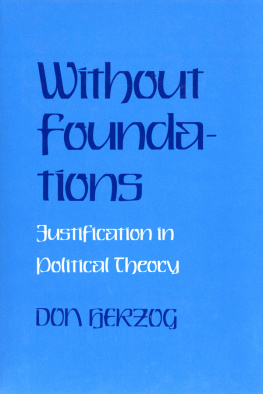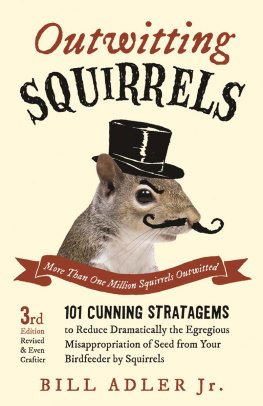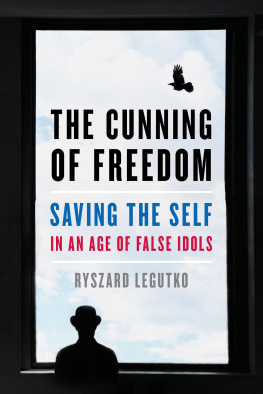CUNNING
CUNNING
Don Herzog
Princeton University Press Princeton
Princeton  Oxford
Oxford
Copyright 2006 by Princeton University Press
Published by Princeton University Press, 41 William Street, Princeton, New Jersey 08540
In the United Kingdom: Princeton University Press, 6 Oxford Street, Woodstock, Oxfordshire, OX20 1TW
All Rights Reserved
Third printing, and first paperback printing, 2008 Paperback eISBN: 978-1-40082-706-0
The Library of Congress has cataloged the cloth edition of this book as follows
Herzog, Don, 1956
Cunning / Don Herzog.
p.cm.
Includes bibliographical references and index. eISBN: 978-1-40082-706-0 1. Deception. I. Title. BJ1421.H47 2006 179.8dc222005015343
British Library Cataloging-in-Publication Data is available
This book has been composed in Adobe Caslon
Printed on acid-free paper.
press.princeton.edu
Printed in the United States of America
3 5 7 9 10 8 6 4
FOR LINDA
Skin me, Brer Fox, sez Brer Rabbit, sezee, snatch out my eyeballs, tar out my years by de roots, en cut off my legs, sezee, but do please, Brer Fox, dont fling me in dat brier-patch, sezee.
JOEL CHANDLER HARRIS
Uncle Remus: His Songs and His Sayings
C O N T E N T S
INTRODUCTION
 I do not marvel in any ways to see such a multitude of people assembled... to behold the unfortunate tragedy of this my wretched life. For the case is rare.... He loved his wife, insisted John Kello at the scaffold. He denied that hed dabbled in magic. But the wicked spirit had urged him to kill his wife to advance his career. (He never explains how she was an obstacle. Was she just set against his promotion? or having to move to some wretched small town? Then, youd think, theyd talk about it or endure some marital spats. But murder? It sounds like a parody of men devoted more to their jobs than to their families.) He tried poisoning her, but she vomited. So he strangled her instead, leaving himself with the usual dilemma, how to dispose of the corpse. Picture him, please, the jittery husband, gingerly embracing his wife as if trying to patch things up after a fight and awkwardly presenting a valedictory gift, a necklace too cumbersome to please, still, his wife complaisant, sweetly uncomplaining: he circled a noose around the corpses neck and left the body hanging as if shed committed suicide.
I do not marvel in any ways to see such a multitude of people assembled... to behold the unfortunate tragedy of this my wretched life. For the case is rare.... He loved his wife, insisted John Kello at the scaffold. He denied that hed dabbled in magic. But the wicked spirit had urged him to kill his wife to advance his career. (He never explains how she was an obstacle. Was she just set against his promotion? or having to move to some wretched small town? Then, youd think, theyd talk about it or endure some marital spats. But murder? It sounds like a parody of men devoted more to their jobs than to their families.) He tried poisoning her, but she vomited. So he strangled her instead, leaving himself with the usual dilemma, how to dispose of the corpse. Picture him, please, the jittery husband, gingerly embracing his wife as if trying to patch things up after a fight and awkwardly presenting a valedictory gift, a necklace too cumbersome to please, still, his wife complaisant, sweetly uncomplaining: he circled a noose around the corpses neck and left the body hanging as if shed committed suicide.
Kello already had drawn up his will, leaving all his property and the childrens care to her. A loving husband could do no more. And he already had spread rumors that she was tempted terribly in the night. Leaving his house keys inside, he slipped out the seldom-used back door of his study. A later tradition of uncertain provenance has it that after killing her, he sailed off to preachKello was a ministerand then invited some of the congregation back to his home, where he was shocked, shocked, to discover the dangling body. Then he anguished over whether those committing suicide could be saved. And that my affection towards her might appear the greater, he denied that God would suffer so innocent a creature to succumb to the temptation and rage of Satan.
Kello was hanged in Edinburgh in 1570. The historical context makes the episode a bit less murky. After the Reformation hit Scotland, just ten or twelve years before Kellos turn at the scaffold, the kirk or church was severely understaffed, (Remember them the next time someone assures you that Islam just needs its own Reformation.) As far as I know, though, the execution of a minister was no everyday yawner. None of this tells us what Kello had in mind for his career or what his wife objected to. Here, too, the historical record is frustratingly opaque.
Kello might have gotten away with it, but the grumbling and gossiping of some of the faithful were getting under his skin. And above all, another minister penetrated the inward cogitations of my heart and interpreted a troubled dream hed had. Staggered by the interpretation, Kello persuaded myself God spoke in him. I persuaded myself will easily bear the sense of I came to believe. But its tempting to construe it as admitting that he talked himself into it. Now why would he? And why would he report the dream in the first place? Was he afflicted by the fabled guilty conscience, plaguing the perpetrator, confronting him with knowing accusers at every turn, transmuting others casual glances into caustic glares? Maybe, but many guilty people dont seem to suffer from such inexorable consciences. Some innocent people do.
What is a guilty conscience, anyway? Just the detritus of years of conditioning, some irrational quirk that happens to be shared by others and vigorously promoted by pompous authorities? If so, can the agile murderer wriggle away from morality? Imagine the psychotherapists ad: Counsel for those in the clutches of the indefensible superstitions of morality. Triumphant testimonials on offer from prior clients now viewed by the base cowards around us as psychopaths. No, shes not offering merely to help out those in sweaty paroxysms of guilt over trivial faults. Shes offering her patients the chance to burst the confines of morality into lives where they never hesitate over whats right or wrong, good or bad. Would you enter such therapy? Should you? Do you flinch at the prospect?
Or is a guilty conscience the still, small voice of God within? Recall how it feels when you want to do something questionable, when youve persuaded yourself that it is the right thing to do, and then you suddenly know that its wrong. Even then, is conscience inescapable? or are some tone-deaf to its stern song? Are they culpable? negligent? or, not to put too fine a point on it, damned? Maybe Kello succumbed to visions of hellfire and the desperate seductions of being a deathbed convert. But how religiously orthodox could he have been? Yes, theres a distinguished tradition of people killing for God, even when they embrace Him as the Prince of Peace. But not killing their wives to advance their careers.
What kind of minister does such a thing? Linger over Kellos activities during the weeks hes planning the murder. Sometimes hes writing his will, figuring out how to get poison without leaving an incriminating trail, and sadly confiding in his parishioners about his wifes alleged nocturnal temptations. Sometimes hes officiating at marriages, baptizing infants, and solemnly urging the faithful to repent for their sins. Youd think he has to be play-acting in those latter activities, right? After all, hes dead serious about disposing of his wife and youd think hed have to be shuddering insideor at least be ironic?when he issues his menacing or beseeching warnings of damnation. But maybe not. Maybe hes entirely serious in both sets of activities. Maybe theres a sort of firewall in his mind separating the lethal plotting from the earnest praying, so that when doing one he never thinks of the other. Then again, maybe both sets of activities run seamlessly, promiscuously, together. As he launches into his homily, he says to himself, No, damn it! cant use a knife, Id never be able to hide itand maybe he says it without even breaking stride, his earnest cadences washing over the assembled faithful. Maybe when he paints his lurid portraits of hell, he grimly concedes to himself that hell roast there, too. Maybe; maybe not. Its hard to imagine whats buzzing around in his head. Then again, its often hard to imagine how we handle the conflicting demands of our own lives. Does the predatory real estate broker flinch when she leans over to embrace her granddaughter? Does the unctuous used car salesman, whose sales commissions depend on his glib dishonesties, flinch when he assures his suspicious wife that she can trust him? Does she smirk?
Next page

















 Princeton
Princeton  Oxford
Oxford